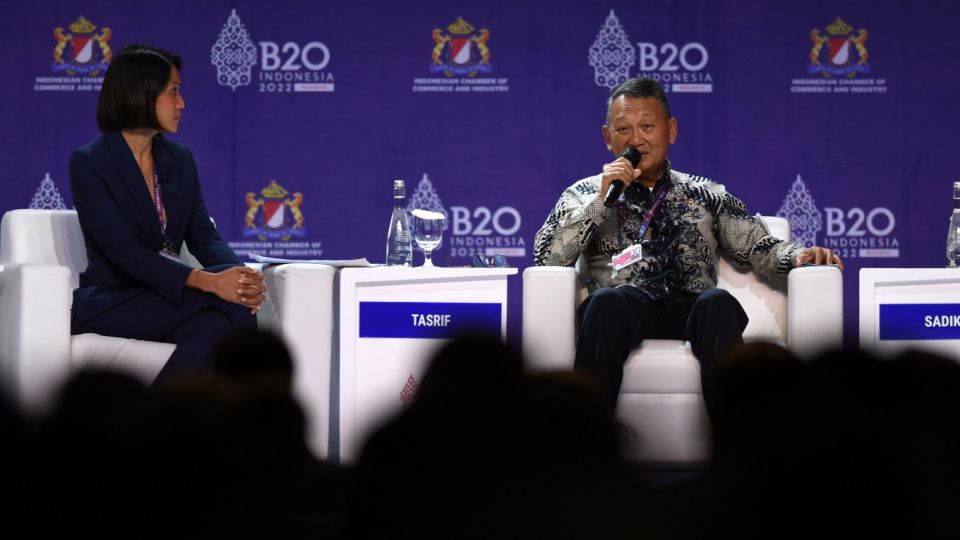November 23, 2022
JAKARTA – The government has admitted that the World Trade Organization ruling on its nickel-export ban was in favor of the European Union.
In a meeting with House of Representatives Commission VII, which oversees energy and technology policies, the Energy and Mineral Resources Ministry announced that the WTO panel had rejected Indonesia’s justification for the policy.
In 2019, the EU launched consultations with Indonesia under the WTO framework about the latter’s restrictions on the export of several raw materials, including nickel, that are necessary for the production of stainless steel.
Registered as dispute DS592, Brussels believed Indonesia had violated Article XI:1 of the 1994 General Agreement on Tariffs and Trade (GATT), which states that WTO members must grant as much access as possible to international trade.
Indonesia sought to justify its policy on the basis of exemptions from that principle stipulated in articles XI:2 (a) and XX (d) of the GATT.
“The government maintains that the panel’s decision does not yet possess permanent legal standing, so there is still a chance to appeal,” Energy and Mineral Resources Minister Arifin Tasrif said on Monday.
The minister continued by explaining that Indonesia was not obliged to change or retract its regulation as long as an appeal process was still ongoing through the WTO’s dispute settlement body (DSB).
According to the ministry’s information, the WTO decided that multiple Indonesian regulations violated the GATT, namely Law No. 4/2009 on Mineral and Coal Mining, Ministerial Regulation No. 11/2019 on Mineral and Coal Mining, Ministerial Regulation No. 96/2019 on the Export of Processed and Refined Mining Products and Ministerial Regulation No. 7/2020 on Mineral and Coal Administration.
The full WTO panel report was decided on Oct. 17, will be made publicly available on Nov. 30 and become part of the DSB agenda on Dec. 20, according to a document shared by the ministry.
“It is necessary to defend our nickel downstream [development] policy by accelerating the construction of smelters,” Arifin continued.
The minister said this would “make clear” that Indonesian nickel was indeed processed into higher-value goods, creating employment and spurring growth in nickel end-user industries.
Arifin said the appeal process would be “a long one”.
When contacted by The Jakarta Post on Tuesday, Deputy Investment Minister Riyatno declined to comment, explaining that the ministry’s position “would first be discussed internally”.
The Trade Ministry’s policy agency head, Kasan Muhri, said it could not comment on the impact of this decision yet due to the government’s decision to appeal.
“An [appeal] will take a long time, so the impact cannot be calculated,” Kasan told the Post on Tuesday.
Trade Ministry International Trade Cooperation Director General Djatmiko Bris Witjaksono told the Post on Tuesday that the government had “not yet” decided any other measures apart from appealing.
“[This is] still in process within the WTO, [it is] still a long [process],” Djatmiko said.
The Office of the Coordinating Economic Minister and the Office of the Coordinating Maritime Affairs and Investment Minister did not respond to requests for comment.
University of Indonesia international trade law expert Wenny Setiawati said on Monday that downstream industrialization could continue for the time being.
However, she said, the government should prepare “alternative solutions” in case the decision made by the WTO’s appellate body would be similar to the panel ruling in case DS952, which would compel Indonesia to revise or retract regulations.
“We must prepare for retaliation,” Wenny told the Post.
State-owned Bank Mandiri nickel analyst Ahmad Zuhdi Dwi Kusuma said on Monday that the was prepared for case DS952, in stark contrast to a similar case in 2017, where the government relented and let nickel ore exports resume.
Currently, he said, domestic downstream industries were much stronger than before, so mining companies would be incentivized to process ores in their smelters rather than export it to international markets, especially if the domestic and international prices were alike.
Supporting strategies, such as the domestic market obligation that mimics the policy on coal, could also be implemented, he noted.
In an exclusive interview with the Post, President Joko “Jokowi” Widodo had already hinted at a possible defeat in the WTO case.
His strategy was to prolong the legal battle at the WTO through the appeal mechanism, which he estimated would take five to 10 years to process, and to develop as much of the domestic industry as possible during that period.
He expressed confidence that that method had already worked in the case of nickel, as Indonesia had shifted to nickel exports from ore exports and was earning much more revenue as a result.
“[Can you] imagine that, for decades, we were only exporting raw materials? Do we want this to continue? We do not,” President Jokowi said on Nov. 2.


